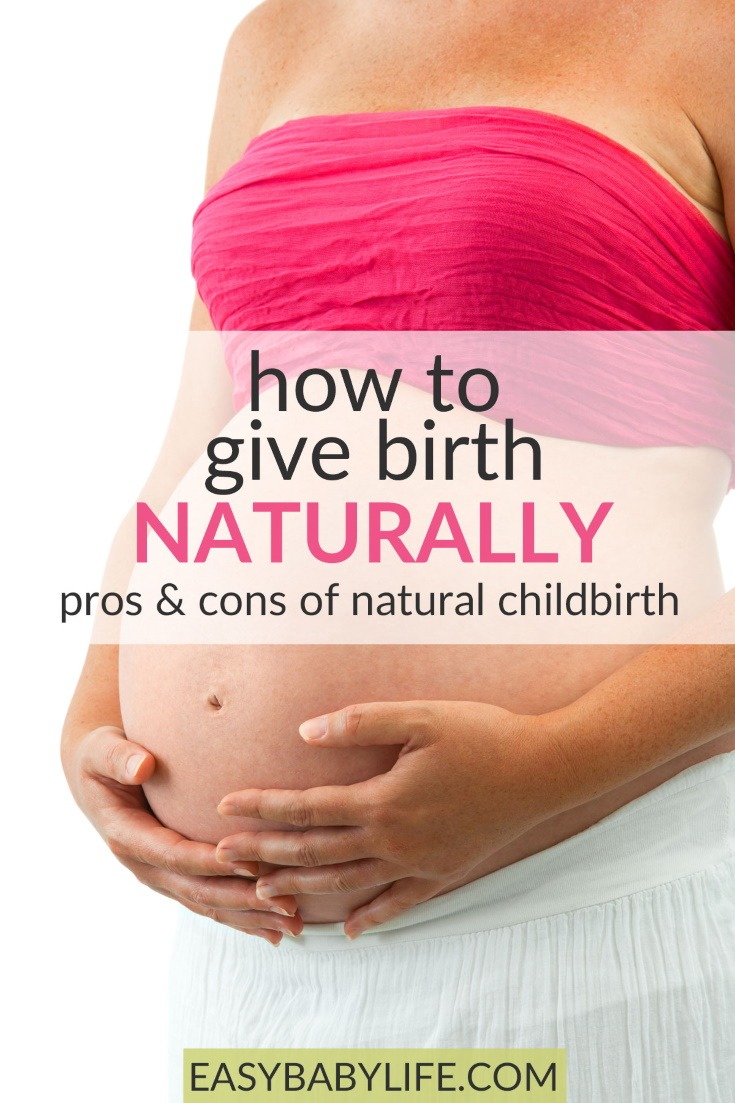Have you considered giving birth naturally?
Learn about the risks, benefits, and how-to’s here and what it means in terms of pain.
Giving birth naturally…
Sounds nice, doesn’t it, especially compared to the opposite; unnatural childbirth..?!
In a way, the phrase is dumb and unclear and may lead to shame for the moms-to-be who, for one reason or another, chose “unnatural childbirth”.
Nevertheless, it is a commonly used phrase and wish, and therefore something to learn more about!
Giving Birth Naturally; The Benefits, Risk and How-to’s
- What does it Mean to Give Birth Naturally?
- Benefits of giving birth naturally
- Risks of natural childbirth
- How to have a natural childbirth
- How painful is it to give birth naturally?
- What if I Can’t Cope With a Natural Birth?
- Education tips for natural childbirth
What Does it Mean to Give Birth Naturally?
So what does it really mean to give birth naturally? Are no pain relief methods allowed at all? No help? How about giving birth in a hospital?
I don’t know of any official definition of natural childbirth, but most people would probably agree that it includes vaginal birth (not a C-section), some more or less strict limits on medical interventions and the use of medical pain relief and also to let the process take its time as long as it is safe for the child and mother.
Note: If you are 7 weeks or more from your due date, consider enrolling in the wonderful online natural childbirth classes by author and childbirth educator Catherine Beier. I love her class and her focus on empowering women to have their best possible birthing experience.
5 Benefits of Giving Birth Naturally
There are several benefits to giving birth naturally:
- You can move around freely, which may both reduce pain and accelerate the birthing. Some types of medical pain relief may restrict your mobility.
- Compared to epidural supported birth, the second stage of labor, i.e. the pushing stage, is usually shorter, which is safer for the child. Studies have also shown that women who used epidurals to need their labor contractions stimulated experience very low blood pressure, be unable to move for a period of time after the birth, have problems passing urine, and suffer fever to a larger extent than those who don’t use this type of pain relief. (To learn more about what it is like to push, click here.)
- The labor pain actually guides the woman subconsciously to move in ways that facilitate the birthing process. For example, back pain may indicate that the child is in a posterior position. The woman may facilitate the baby’s rotating in the birth channel by moving.
- The woman can continue to eat and drink during natural childbirth, which helps her energy levels and hence facilitate the birthing.
- According to research, newborn babies are more alert and involved in pre-breastfeeding behavior, such as suckling after natural childbirth. Many pain-relief drugs do affect the child too. (Source)
Risks of natural childbirth
The benefits of natural childbirth sound great, don’t you think? Well, there are also some risks and downsides to giving birth naturally. To be able to make an informed choice, you need to consider these too:
- During very long labor, not getting any pain relief at all may be very exhausting and demotivating for a woman.
- For someone who is very scared, the labor pain may be unbearable, making the person tenser and therefore the pain can affect the birthing process negatively. In such a case, pain relief may be the best way to help the mother relax and focus on the positive aspects of giving birth to her child.
- For those who do not want any medical intervention at all, including heart-rate monitoring of the child, there is a risk that negative changes in the baby’s well-being will be missed. In my opinion, giving birth naturally should still be accompanied by fetal heart rate monitoring in some way.
- Generally, giving birth naturally is safe for a healthy woman and child in a low-risk pregnancy. However, it can turn into a risky event if the mom ignores her doctor’s recommendations or refuses medical intervention in case something unexpected happens. A home birth without proper support, too far away from medical assistance, can, of course, also turn into a dangerous situation.
How to Have a Natural Childbirth
Depending on where you live, it may be easier or harder to be supported in your choice to give birth naturally. These days, some version of natural childbirth is, however, getting more common in many places.
Here are some things to consider when planning for natural childbirth:
- If you can, you can choose a birth center, doctor, or midwife who supports and assists you in planning and going through natural childbirth. If you want to give birth at a hospital, natural childbirth is still entirely possible, but it may help if you get a chance to talk to someone at the hospital about it.
- Write a birth plan, explaining your thoughts and wishes. In most places, the woman’s birth plan will be respected if possible.
- You may want to consider hiring a doula since they are usually very supportive when it comes to giving birth naturally and will also help you through the birthing, with breathing, relaxation, labor positions et cetera.
- Get educated! Make sure you know as much as possible about labor positions, relaxation techniques, the stages of labor, the effects of different kinds of pain relief, and so on. The more you know, the easier it will be for you to stay in charge of your own process.
- Educate your spouse too or birth partner. Bring your spouse along to a breathing course! Or, as a minimum, ask him or her to study books about giving birth and about giving birth naturally. (You’ll find several book and course tips at the bottom of this page) As your partner, while giving birth, if he or she can learn breathing techniques too and back massage to relieve your pain, the two of you can make a great team during childbirth.
- Stay humble. It is great to plan how you want your birth to proceed. But childbirth can’t be planned. Unexpected things may happen. Your own personal experiences might make you change your mind about how you want things when you are in the middle of the birthing process. Don’t be disappointed with anything or with yourself if what you planned didn’t work out as expected. Maybe you will need pain relief to endure. Maybe the baby needs help to be born. So what? When you are actually giving birth; be relaxed, stay focused, and go with the flow. Do not pass any judgment whatsoever on yourself!
How Painful is it to Give Birth Naturally?
Before giving birth, thoughts and worries about the pain are very common. And sure, giving birth is painful without (and even with) pain relief.
However, if you understand why it is painful, and what is going on during the stages of labor, the pain doesn’t have to scary. I was terrified of giving birth until I realized that, for the most part, the pain was simply from the uterus slowly opening up rather than (as I thought) from the child forcing its way.
It is really only through the second stage of labor(when you push), which is the shortest one, that the pain to some extent is related to the child coming out. (Learn how to push during labor here.)
It is painful; anyone who tells you differently basically lies. But it is not dangerous, and there are efficient ways, in addition to strong drugs, to mitigate the pain:
- Proper breathing and relaxation are great ways to reduce pain. Staying completely relaxed makes a huge difference to how painful it is. Focusing on breathing ensures you don’t panic, get the proper amount of oxygen, and think of something other than the pain. Very efficient!
- There are many options to mitigate pain in addition to medical pain relief. A few natural pain relief methods are counter pressure, breathing techniques, water, massage and acupuncture, and hypnosis. Even listening to music has been shown to reduce pain during labor, but only to a small extent, so I would definitely go for other, more efficient options… In this article, you can learn more about pain relief options. Natural pain relief is dealt with in the latter part of the article.
What if I Can’t Cope With a Natural Birth?
This is a good question! What if you have set out to have a natural childbirth and then you just can’t cope with the pain, exhaustion, the time it takes, or something else?
This would be a pretty normal feeling – it is quite common for women to simply want to put on there and walk away from it all in the middle of the birthing. (Not that it is possible, but they still really want to!)
That feeling does pass. And the baby will be born.
A good birth is much more important than a natural one!
But if you really can’t cope – then just say so and ensure you get help! It is easy to be tough before the contractions start, but who knows how you will feel later on.
Let go of any feelings of failure if you suddenly change your mind and want medical pain relief, for example. A good birth is much more important than a natural one!
Good luck with your childbirth,
Paula
Get immediate expert help with your pregnancy questions through JustAnswer Pregnancy:Book Tips for Natural Childbirth
There are many excellent books and courses to learn about giving birth naturally. The following books and DVDs are recommended:
- Prenatal Yoga – Strengthening and Opening (Online Class)
- Mindful Birthing: Training the Mind, Body, and Heart for Childbirth and Beyond
- Natural Hospital Birth: The Best of Both Worlds
- Childbirth without Fear: The Principles and Practice of Natural Childbirth
Read Next On Natural Child Birth
- Giving Birth In Water
- Natural Childbirth Videos
- How To Push During Labor
- How To Induce Labor Naturally
- Birth Stories from Fellow Moms

Paula Dennholt founded Easy Baby Life in 2006 and has been a passionate parenting and pregnancy writer since then. Her parenting approach and writing are based on studies in cognitive-behavioral models and therapy for children and her experience as a mother and stepmother. Life as a parent has convinced her of how crucial it is to put relationships before rules. She strongly believes in positive parenting and a science-based approach.
Paula cooperates with a team of pediatricians who assist in reviewing and writing articles.








